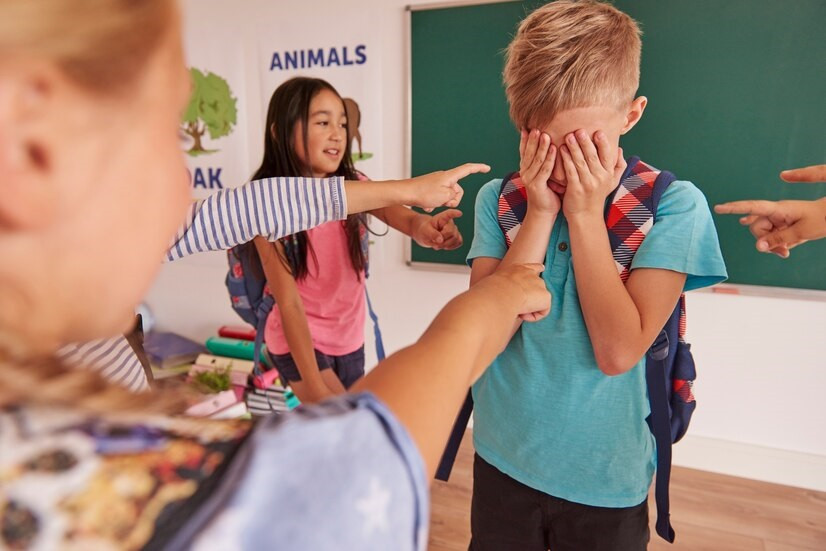Bullying adalah bentuk perilaku agresif di mana seseorang dengan sengaja dan berulang kali menyebabkan cedera atau ketidaknyamanan pada orang lain. Bullying bisa berupa kata-kata yang memengaruhi mental korban, tindakan yang lebih "halus" atau "tidak kentara", memeras uang dan barang milik korban hingga kekerasan fisik.
Cara Menghadapi Pelaku Bullying
Tidak ada orang tua yang ingin anaknya mengalami bullying, tetapi mengawasi anak 24 jam dalam sehari tentunya menjadi hal yang sulit. Bila terus dibiarkan, efek perundungan ini bisa berdampak serius pada anak.
Berikut adalah beberapa hal yang bisa Anda sarankan pada anak untuk menghadapi pelaku bullying:
Menghindari Pelaku dan Memanfaatkan Buddy System
Menghindari pelaku bullying sangat penting untuk membantu menjaga keamanan dan kesejahteraan anak di sekolah. Pelaku bullying cenderung melakukan perundungan ketika anak sendirian dan terlihat lemah. Dengan menghindari pelaku, maka kemungkinan terjadinya tindakan perundungan dapat menurun.
Sedangkan buddy system (teman) membantu meningkatkan rasa aman dan percaya diri bahwa ada orang yang dapat membantu dan mendukung dalam situasi apa pun. Dengan memiliki teman yang dapat menjadi pendengar dan pendukung, risiko stres dan gangguan kesehatan mental juga akan berkurang.
Menahan Emosi
Merupakan hal yang wajar ketika anak ikut marah pada anak lain yang melakukan perundungan. Namun, hal tersebut bisa mendorong intimasi lebih berkembang khususnya jika pelaku perundungan memiliki tubuh yang lebih besar dan juga mendapatkan dukungan dari teman-teman lain.
Katakan pada anak untuk berlatih tidak bereaksi, tidak menangis ataupun terlihat marah dan pergi dengan tenang agar terbebas dari bahaya dan tidak memancing reaksi pelaku perundungan.
Baca Juga: Kenali Tanda-Tanda Jika Anak Mengalami Bullying di Sekolah
Bersikap Berani dan Mengabaikan
Ajarkan anak untuk bersikap tegas dan berani serta memberi tahu pelaku untuk berhenti membully. Setelah mengungkapkan pernyataan untuk meminta pelaku berhenti mengintimidasi, abaikan segala sesuatu komentar negatif dan menyakitkan.
Dengan mengabaikan intimidasi yang dilakukan dan menunjukkan sikap tidak peduli, pelaku perundungan mungkin akan bosan dan tidak lagi mengganggu anak Anda.
Menceritakan pada Orang Dewasa
Hal penting lainnya adalah mengajarkan anak untuk melaporkan setiap intimidasi atau perundungan pada orang tua dan juga guru. Sering kali anak-anak lebih memilih diam dan tidak melaporkan apa yang dialami karena takut orang tua akan marah atau memberikan hukuman.
Sebagai orang tua, Anda juga perlu menjadi pendengar yang baik dan mendukung anak dengan menunjukkan bahwa Anda memahami apa yang dirasakan anak. Selanjutnya, Anda mungkin perlu berbicara pada guru, kepala sekolah, serta jajarannya ataupun pihak berwajib untuk membantu menyelesaikan masalah tersebut.
Kapan Perlu Mengajak Anak ke Dokter?
Perundungan dapat menyebabkan depresi, kecemasan dan gangguan kesehatan mental lainnya. Anak-anak yang dirundung cenderung mengalami kecemasan dan depresi, mulai dari yang ringan hingga parah.
Ajak anak mengunjungi dokter dan mendapatkan pemeriksaan lebih lanjut ketika menunjukkan beberapa tanda berikut:
- Memiliki perubahan pola makan dan berat badan, baik menolak makan atau makan terus-menerus
- Tidak bisa tidur atau tidur terus-menerus
- Merasa tidak bahagia atau tidak berguna
- Tidak lagi terlihat menikmati kegiatan menyenangkan yang biasa dilakukan
- Sering tiba-tiba menangis
- Sulit konsentrasi dan fokus di sekolah
- Sering menarik diri dan menyendiri
- Sering mengeluh sakit kepala atau sakit perut
- Berpikir untuk menyakiti diri sendiri
- Berusaha bunuh diri
Baca Juga: Apa yang Sebaiknya Dilakukan Orang Tua Saat Anak Depresi?
Memiliki banyak pertanyaan terkait perundungan anak? Konsultasikan kondisi anak Anda dengan dokter ahli di Ai Care melalui aplikasi yang bisa diunduh lewat Playstore atau Appstore.
Mau tahu informasi seputar kehamilan, menyusui, kesehatan wanita dan anak-anak? Cek di sini, ya!
- dr Nadia Opmalina
Kids Health. Helping Kids Deal With Bullies. Available from: https://kidshealth.org/en/parents/bullies.html.
American Psychological Association. Bullying. Available from: https://www.apa.org/topics/bullying.
Unicef. How to talk to your children about bullying. Available from: https://www.unicef.org/end-violence/how-talk-your-children-about-bullying.
Better Help (2023). The link between bullying and depression. Available from: https://www.betterhelp.com/advice/depression/the-link-between-bullying-and-depression/.












